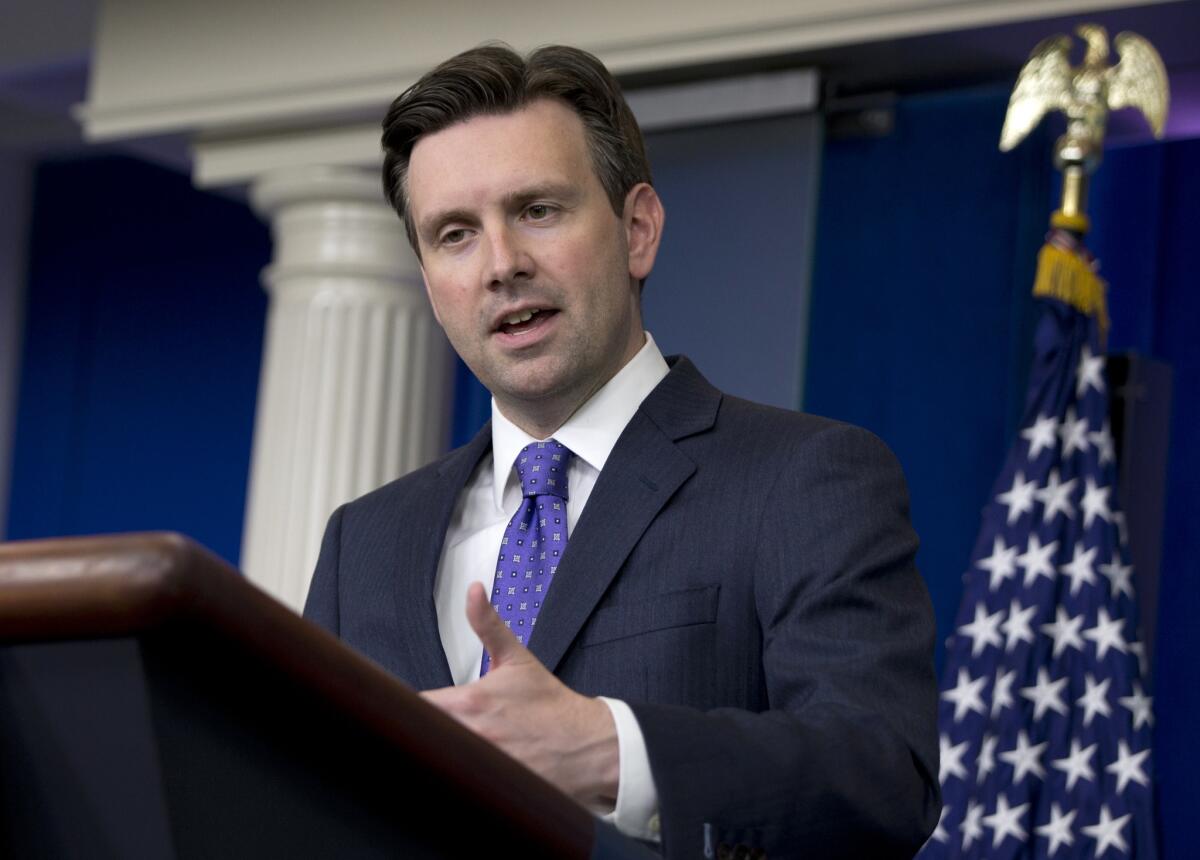White House reaffirms strategy in Iraq despite fall of Ramadi

White House spokesman Josh Earnest speaks during a news briefing at the White House on May 19.
- Share via
Reporting from Washington — President Obama huddled with his top security advisors Tuesday at the White House to consider U.S. strategy in Iraq two days after Islamic State fighters routed government forces and took control of a major provincial capital, a sharp setback for U.S. interests.
Administration officials downplayed the loss of Ramadi, about 70 miles west of Baghdad, to the militants but acknowledged that they are watching warily as Shiite militias converge on the Sunni-dominated city, threatening new sectarian tension.
After the briefing, the White House said it would support Iraqi moves to speed up efforts to train and arm local tribal fighters in Anbar province, expand recruitment into the Iraqi army, train local police and “develop a consolidated plan to retake Ramadi” under Iraqi control.
The loss of Ramadi undermines the administration’s recent claims of growing progress in its efforts to dislodge the Sunni Islamic militants in Iraq and Syria through a mix of airstrikes, support for the Baghdad government and its armed forces, and other efforts.
Josh Earnest, the White House spokesman, argued that the strategy has “yielded important successes” and does not need substantial revision.
“Are we going to light our hair on fire every time there’s a setback?” Earnest said.
Pentagon planners do not believe that Ramadi’s fall, while discouraging, gives Islamic State a foothold to threaten the Iraqi capital, Baghdad.
“They had controlled 80 to 90% [of Ramadi] for a while and now they have the whole thing,” said a senior U.S. military officer, who spoke on condition of anonymity to discuss internal deliberations. “It hasn’t shifted the overall battlefield that much.”
In any case, U.S. options are limited for now.
U.S. military planners are reluctant to use airstrikes in an urban area like Ramadi, fearing civilian casualties. And they are wary of appearing to support the sectarian militias, some of which are backed by Iran.
“To the extent the militias are willing to come under the control of the Iraqi chain of command, we will continue our assistance,” said the senior U.S. military officer. “Anything less than unity of effort [between them] in Ramadi would be problematic.”
When an Iraqi-led effort to retake the city of Tikrit stalled in March, the Pentagon agreed to bomb only after most civilians fled the city and Shiite militias agreed to pull back temporarily from the outskirts, so the U.S. would not be seen as backing them with air power.
Thousands of Iranian-allied Shiite militias have begun mobilizing to retake Ramadi. Iran’s defense minister, Brig. Gen. Hossein Dehqan, reportedly flew into Baghdad on Monday.
U.S. officials said they will wait until the Iraqi army is ready to reclaim the city, and then will assist with airstrikes, intelligence and tactical advice.
“They will determine the timelines. They will determine the planning. They will determine the resourcing,” Col. Steve Warren, a Pentagon spokesman.
Retaking the provincial capital, a sprawling city of narrow alleyways and walled compounds, will test the capabilities of the Iraqi security forces, even with U.S. airstrikes.
“I absolutely am not going to get into a timeline, but it will be a difficult fight,” Warren said.
Officials played down the possibility that U.S. troops could be sent to advise Iraqi forces, or to call in airstrikes.
“If we get a bunch of Americans in there, that’s probably precisely what ISIL wants” to spur its fighters, the senior military officer said, using a common acronym for Islamic State.
U.S. officials said they aren’t considering a more drastic option: scaling back the current U.S. mission in favor of a “containment” strategy that would seek to keep Islamic State confined to Iraq and Syria, where the group has declared an Islamic caliphate.
“Containment is our last course of action and we’re not there,” said the official.
Officials said they were concerned about calls by Iraqi officials for militias and tribal fighters to converge on Ramadi to help reclaim the city.
The biggest worry is that semi-independent Shiite militias receiving advice and equipment from Iran will attack Ramadi on their own, with only nominal control by Iraqi military commanders.
A Shiite-led attack could deepen Iraq’s already volatile sectarian tension. It probably would force a halt in U.S. airstrikes and other assistance around the city to avoid being seen as taking the side of the Shiites.
But U.S. officials also are worried about Sunni tribal fighters descending on Ramadi, either to fight Islamic State on their own or to take on the Shiite militias.
U.S. officials acknowledged that Islamic State militants are using the impending arrival of Shiite militias to try to bolster their support from fellow Sunni Muslims in Anbar.
Warren said the Pentagon had “seen reports” of Islamic State brutality against Ramadi residents since the city fell.
“Murders, brutalization, looting, robbery -- all of the things that has come to be a hallmark ISIL barbarism is something that the inhabitants of Ramadi now are going to be subjected to,” he said.
Iraqi troops that retreated from Ramadi abandoned armored personnel carriers, a small number of artillery pieces and half a dozen tanks that are now in the hands of Islamic fighters, Warren said.
Staff writers Brian Bennett and Christi Parsons contributed to this report.
More to Read
Sign up for Essential California
The most important California stories and recommendations in your inbox every morning.
You may occasionally receive promotional content from the Los Angeles Times.












